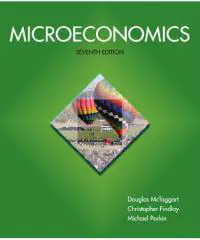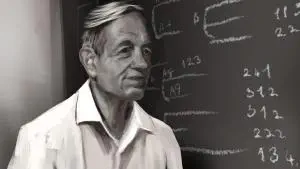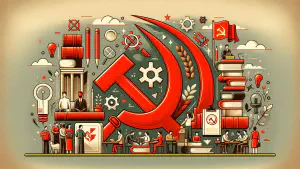Overview
The “chicken game” is a classic concept in game theory. It’s a model used to study conflict, cooperation, and decision-making in situations where the outcome for each player is not only determined by their own choices but also by the choices made by others.
The game gets its name from a dangerous teenage dare that was popularized in movies and cultural anecdotes. In this dare, two drivers speed directly toward each other on a collision course. The first to swerve away is deemed the “chicken,” implying cowardice, while the other driver is the winner, having proved their bravery. However, if neither driver swerves, they crash into each other, resulting in a dire outcome for both.
In a simplified version of the chicken game, each player has two options: to swerve or to continue driving straight. If one player swerves and the other continues straight, the player who swerves loses and the other wins. If both players swerve, neither wins nor loses – it’s a draw. But if both players drive straight, they crash, which is the worst possible outcome for both.
The chicken game is used to illustrate scenarios where two parties can either cooperate (by swerving) or compete (by driving straight). The risk of mutual non-cooperation (both driving straight) is a disaster. Yet, the temptation for each individual is to drive straight, hoping the other will swerve.
This game provides insights into many real-world situations where nations, organizations, or individuals face similar dilemmas. From political standoffs, nuclear deterrence, and trade wars to personal relationships, the chicken game captures the tension between risk, reward, and strategy in decision-making.
In Context
The bottom matrix represents a chicken game in which the absence of action can lead to dire consequences. Consider a city threatened with a flood whose residents must decide whether to sandbag the river banks prior to an impending (certain) flood. The height of the sandbags is a public good. Providing no sandbags whatsoever will result in harm to everyone when the flood comes, so that the payoffs from collective inaction are negative rather than zero. These dire consequences can be avoided if someone acts. The game is named chicken because each player would like to hold out so that the other player acts (or “chickens out"). Similarly, doing nothing about a pollution threat may give negative, not zero, payoffs and a chicken game scenario. To illustrate the chicken game, suppose that the underlying contribution game is the same as the upper Prisoners’ Dilemma game of Figure 2.1, except that a harm of −3 befalls both players if nothing is contributed. Otherwise, the payoffs in matrix c of Figure 2.3 are those in the top matrix of Figure 2.1. The chicken game is a type of coordination game with no dominant strategy and two pure-strategy Nash equilibriums, where a single player contributes. The chicken game’s Nash equilibriums are not social optimums because mutual contributions imply 8 in aggregate benefits, which exceed those of 4 at the equilibriums. A collective failure is ever present because the chicken game may result in an even worse outcome if each player does nothing by assuming that the other will act, so that each ends up with -3. Leadership will result in a Nash equilibrium but not the social optimum, which requires even more coordination than merely taking the initiative. In a chicken game, leadership involves not contributing and trying to stick the other player with the action.
The Nash equilibrium for the prisoners’ dilemma is unique: Both players cheat (confess). Not all games have a unique equilibrium, and one that doesn’t is a game called ‘chicken’.
An Example of the Game of Chicken
A graphic, if disturbing, version of ‘chicken’ has two cars racing towards each other. The first driver to swerve and avoid a crash is the ‘chicken’. The payoffs are a big loss for both if no one ‘chickens out’; zero for both if both ‘chicken out’; and zero for the chicken and a gain for the one who stays the course. If player 1 swerves, player 2’s best strategy is to stay the course; and if player 1 stays the course, player 2’s best strategy is to swerve.
An Economic Example of Chicken
An economic game of chicken can arise when R&D creates a new technology that cannot be kept secret or patented, so both firms benefit from the R&D of either firm. The chicken in this case is the firm that does the R&D. Suppose, for example, that either Apple or Nokia spends $9 million developing a new touch-screen technology that both would end up being able to use regardless of which of them developed it. Table 16.4 illustrates a payoff matrix for the game that Apple and Nokia play. Each firm has two strategies: Do the R&D (‘chicken out’) or do not do the R&D. Each entry shows the additional profit (the profit from the new technology minus the cost of the research), given the strategies adopted. If neither firm does the R&D, each makes zero additional profit. If both firms conduct the R&D, each firm makes an additional $5 million. If one of the firms does the R&D (‘chickens out’), the chicken makes $1 million and the other firm makes $10 million. Confronted with these payoffs, the two firms calculate their best strategies. Nokia is better off doing R&D if Apple does no R&D. Apple is better off doing R&D if Nokia does no R&D. There are two Nash equilibrium outcomes: Only one of them does the R&D, but we can’t predict which one. You can see that an outcome with no firm doing R&D isn’t a Nash equilibrium because one firm would be better off doing it. Also both firms doing R&D isn’t a Nash equilibrium because one firm would be better off not doing it. To decide which firm does the R&D, the firms might toss a coin, called a mixed strategy.









